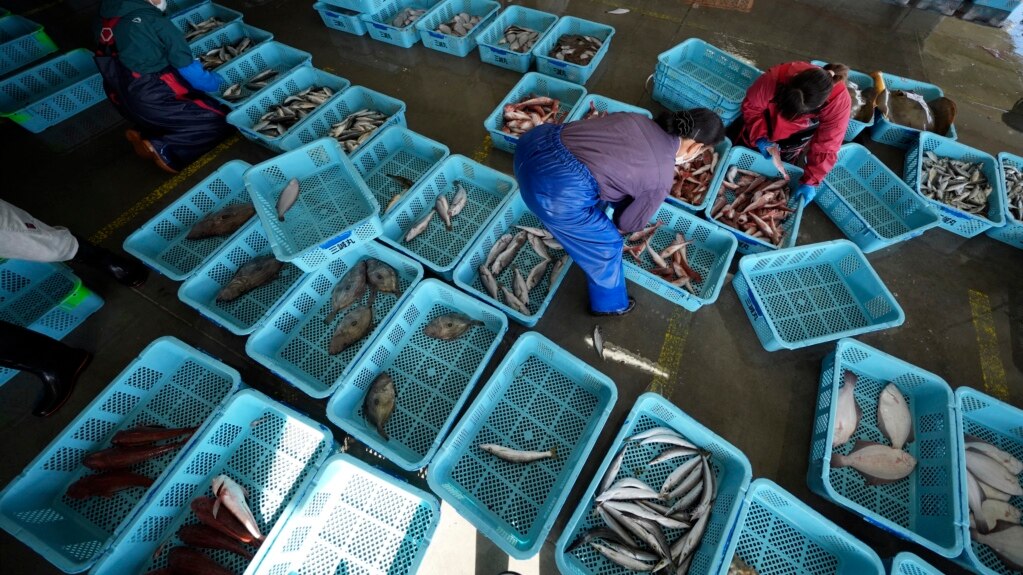People from all over Japan are purchasing fish caught in the waters near the Fukushima nuclear power plant.
In August, the power plant started releasing treated and diluted radioactive water from holding tanks into the ocean. The power complex had suffered some equipment meltdowns after huge waves flooded the area in 2011 following an earthquake. The water release is part of the Tokyo Electric Power Company plan to shut the plant.
The Japanese government says the water is safe and it will be continually observed. However, some nations that once purchased a large amount of Japanese seafood are no longer doing so.
China has banned seafood from Japan. The regions of Hong Kong and Macau followed along.
Russia also announced restrictions on Japanese seafood in mid-October.
In South Korea, many people are concerned that the radioactive water will hurt fish close to home. Many people are no longer buying fish in South Korean markets.
But people in Japan are trying to support the fishing industry by buying fish and seafood.
At a fish store near the Onahama Port in Fukushima, one seller said he was “half surprised, half relieved.” Business owner Kazuto Harada had a tank of live lobsters captured in local waters for sale. He said he has not heard any concerns about the water release.
Fukushima fish sellers are getting orders from all over Japan. People ask for fish called Jaban-mono, which means fish from Fukushima and nearby Ibaraki. The buyers like flounder and greeneye.
Almost all the fish at the market is sold by the afternoon.
The water release will continue for many years.
Futoshi Kinoshita is the executive of Foodison, which owns the Sakana Bacca group of seafood stores. He said usual testing of fishing waters is important. But, he said it is more important that people gain trust in the seafood as they watch friends and family eat the fish. “I hope the circle of confidence will expand,” Kinoshita said.
The International Atomic Energy Agency approved the Japanese plan to release the water. The group said the water release is going well so far and said the plan will have very little effect on fish and the environment. The latest water release took place last week.
So far, fish prices have remained firm, or even gone up a small amount. However, one fisheries official remains watchful.
Katsuya Goto said any mistake could be very damaging to the public’s trust that the fish is safe.
“The government and TEPCO have begun this despite local fishers’ opposition, so we must watch and make sure they do it right,” he said.
To support the Fukushima seafood business, the Tokyo government launched a campaign in October called “eat and cheer.” It runs through the end of the year. The campaign targets customers interested in high-priced seafood such as lobster.
Then, in 2024, a group of well-known Kaiseki chefs in the city of Kyoto will start menus that use fish from Fukushima.
Yoshinori Tanaka is one of the chefs. His restaurant in Kyoto is called Toriyone. He said fish from local waters are a necessity for Japanese food. He urged the government to continue worrying about water safety. He said seeing people enjoy the Fukushima fish on their menus can also help ease “safety concerns that some people have.”
So far, people in the seafood business are happy with all the support. Experts, however, warn that such programs will not last forever. They suggest long-term programs to keep the fishing businesses going and efforts to avoid any accidents with the water release.
Today there are many fewer fishermen in the Fukushima area and they bring in fewer fish than before the nuclear disaster in 2011. And with the recent interest in fish from Fukushima, some fish sellers are not able to meet demand.
Hiroharu Haga is the manager of Ichiyoshi, a fish store in Onahama. He said the supply of Fukushima fish is still limited.
“I wish I could sell more local fish,” he said.
I’m Dan Friedell.
And I'm Jill Robbins.

